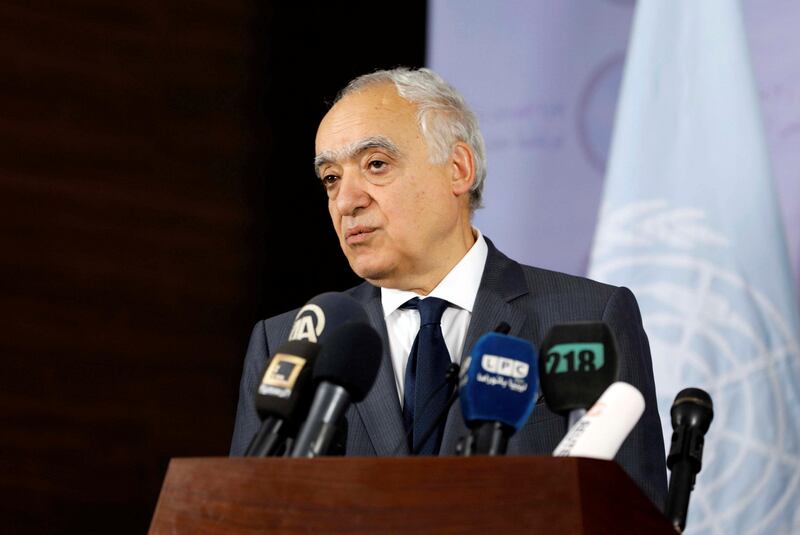The new UN envoy to Libya faces a huge challenge in bringing peace to Libya following his first visit to Tripoli on Friday.
Ghassan Salame, a Lebanese academic and former culture minister, is hoping to persuade Libyan factions to accept the Joint Declaration, a peace deal made in Paris on July 25 between head of the Government of National Accord, Fayez Al Sarraj, and Field Marshall Khalifa Haftar, military commander of the rival House of Representatives parliament.
The cornerstone of the declaration is a ceasefire to end Libya’s three-year civil war, but this has failed to transpire, with combat continuing on a number of fronts.
After meeting with Mr Al Sarraj in Tripoli on Friday, Mr Salame told journalists: “The time factor is very important here. Every passing day without a political agreement has negative security, economic and social consequences for Libyans.”
Mr Salame is due to fly in the coming days to the House of Representatives’ base in Tobruk, hoping to find common ground between legislators there and the GNA presidency on forming a unity government, a key step in the Joint Declaration.
Tobruk legislators have so far refused to accept the GNA, saying it is not legitimate, and battlefield success has put the HOR in a strong position.
A series of military victories against pro-GNA militias have seen the field marshal’s Libyan National Army gain control of most of eastern and central Libya, giving the HOR authority over approximately two-thirds of the country. Those victories leave the House of Representatives and its leader, Field Marshall Haftar, in a strong bargaining position.
The GNA’s position by contrast is weak. Since arriving in Tripoli in March 2016, it has failed to win popularity, and three of its original nine presidency members have quit. With no security force of its own, the GNA relies on militias for protection, but the Joint Declaration mandates that militias must disarm. So far, none have done so.
Publicly, the GNA insists a peace deal is possible.
“We agreed that there is a need more than ever to reach an urgent solution to the crisis in Libya, so that we can end the suffering of Libyans,” said Mr Al Sarraj following his meeting with Mr Salame.
_____________
Read more:
[ The rise and rise again of Libya's Field Marshal Khalifa Haftar ]
[ New UN envoy to Libya vows 'respect' for sovereignty ]
_____________
As he embarks on what is likely to be a round of shuttle diplomacy between the rival capitals in Tripoli and Tobruk, the last thing Mr Salame needs is a fresh cause of division. But that is exactly what he has got after the arrival last week of an Italian warship in Tripoli to support operations against migrant-smugglers.
The warship was invited by the GNA to support its coast guard in intercepting migrant-smuggling boats, but the HOR has declared the deployment a violation of national sovereignty. Field Marshall Haftar has instructed naval and air units to confront foreign warships operating without HOR permission in Libyan waters, without mentioning Italy by name.
Even the GNA is divided on the Italian deployment, with one presidency member, deputy prime minister Fathi Al Mejbari, calling on Friday for Rome to “immediately stop the violation of Libyan sovereignty”.
Italy insists its ships will assist Libyan units and take no direct role in operations against migrant-smugglers, but the ship’s arrival saw small protests in Tripoli with a number of Italian flags set on fire.
This led to the Italian embassy in Tripoli protesting against the reporting of the protests, tweeting on August 4: “Stop spreading fake news [about] big protests in Tripoli. [Italy] committed to help [Libya] and won’t listen to those who want chaos to continue.”
Stop spreading #fakenews abt big protests in #Tripoli. 🇮🇹 committed to help 🇱🇾 & won't listen to those who want chaos 2 continue
— Italy in Libya (@ItalyinLibya) August 4, 2017
One piece of good news for Mr Salame is that Libya’s Constitutional Assembly, elected in 2014 to agree a new constitution, announced on July 31 that a draft of that constitution is finished. The draft calls for Libya to be governed by an elected president and two houses of parliament.
The problem is that this constitution cannot come into force until it gets a ‘yes’ vote in a national referendum, and holding a referendum is likely to be impossible until all sides agree to a ceasefire.





